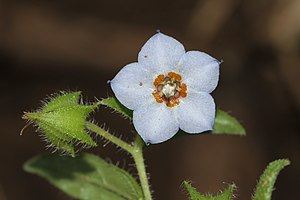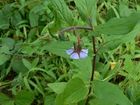Note: This is a project under development. The articles on this wiki are just being initiated and broadly incomplete. You can Help creating new pages.
Difference between revisions of "Trichodesma indicum - Adhapuspi, Indian Borage"
(→Identification) |
|||
| Line 21: | Line 21: | ||
===Flower=== | ===Flower=== | ||
| − | {{Flower|Unisexual|4-8cm long|Blue|Flowering from September-November and January-March}}. | + | {{Flower|Unisexual|4-8cm long|Blue||Flowering from September-November and January-March}}. |
===Fruit=== | ===Fruit=== | ||
| − | {{Fruit|Smooth||Smooth on the outer and rugosely pitted on the inner face. | + | {{Fruit|Smooth||Smooth on the outer and rugosely pitted on the inner face.|In almost free, 4 nutlets|Fruiting throughout the year.}} |
| − | |||
| − | |In almost free, 4 nutlets}} | ||
===Other features=== | ===Other features=== | ||
Revision as of 16:17, 5 August 2021
Adhakpuspi is an Indian medicinal plant found in the Indian subcontinent. These are widely distributed as a weed throughout India. They grow to an altitude of about 1500 m in the Himalayas and it is used as a fertiliser and as an herbal medicine.
Contents
Uses
Arthritis, Anorexia, Dysentery, Skin dise, Snake bite, Dairrhea, Dysmenorrhea, Abortion case.
Parts Used
Chemical Composition
The seed of the plant contains lenoleic acid, Oleic acid, palmatic acid.The leaves cotains hexaconase, Ethylhexacosanoate, Ethylester and 21, 24 Hexacosadeinoic acid.[2]
Common names
| Language | Common name |
|---|---|
| Kannada | Athomukhi, Kattetumbesoppu |
| Hindi | Anadhahuli, Chotakulpha |
| Malayalam | Kilukkamtumpa |
| Tamil | Kulittaitumpai, Kallutaitumpai |
| Telugu | Guvagatti |
| Marathi | NA |
| Gujarathi | NA |
| Punjabi | NA |
| Kashmiri | NA |
| Sanskrit | Adhapushpi |
| English | Indian Borage |
Habit
Herb.
Identification
Leaf
| Kind | Shape | Feature |
|---|---|---|
| Simple | Oblong-lanceolate | Leaf Apex is Acite and its base is Acute-auriculate.it has entire leaf margin |
.[3]
Flower
| Type | Size | Color and composition | Stamen | More information |
|---|---|---|---|---|
| Unisexual | 4-8cm long | Blue | Flowering from September-November and January-March |
.
Fruit
| Type | Size | Mass | Appearance | Seeds | More information |
|---|---|---|---|---|---|
| Smooth | Smooth on the outer and rugosely pitted on the inner face. | In almost free, 4 nutlets | Fruiting throughout the year. | {{{6}}} |
Other features
List of Ayurvedic medicine in which the herb is used
Where to get the saplings
Mode of Propagation
How to plant/cultivate
The plant is found as a weed in many areas of the tropics and subtropics.[4]
Commonly seen growing in areas
Himalayas, Cultivated fields, Dry stony wastelands, Black cotton soil.
Photo Gallery
References
- ↑ Karnataka Medicinal plants book by Dr.M. R. Gurudeva, Page no:50
- ↑ Easy ayurveda
- ↑ Morphology
- ↑ Trophical plants
External Links
- Ayurvedic Herbs known to be helpful to treat Arthritis
- Ayurvedic Herbs known to be helpful to treat Anorexia
- Ayurvedic Herbs known to be helpful to treat Dysentery
- Ayurvedic Herbs known to be helpful to treat Skin dise
- Ayurvedic Herbs known to be helpful to treat Snake bite
- Ayurvedic Herbs known to be helpful to treat Dairrhea
- Ayurvedic Herbs known to be helpful to treat Dysmenorrhea
- Ayurvedic Herbs known to be helpful to treat Abortion case
- Herbs with Whole plant used in medicine
- Herbs with Roots used in medicine
- Herbs with common name in Kannada
- Herbs with common name in Hindi
- Herbs with common name in Malayalam
- Herbs with common name in Tamil
- Herbs with common name in Telugu
- Herbs with common name in Sanskrit
- Herbs with common name in English
- Habit - Herb
- Index of Plants which can be propagated by Seeds
- Herbs that are commonly seen in the region of Himalayas
- Herbs that are commonly seen in the region of Cultivated fields
- Herbs that are commonly seen in the region of Dry stony wastelands
- Herbs that are commonly seen in the region of Black cotton soil
- Herbs
- Ayurvedic herbs that don't have flower, fruit and leaf photos
- Boraginaceae




